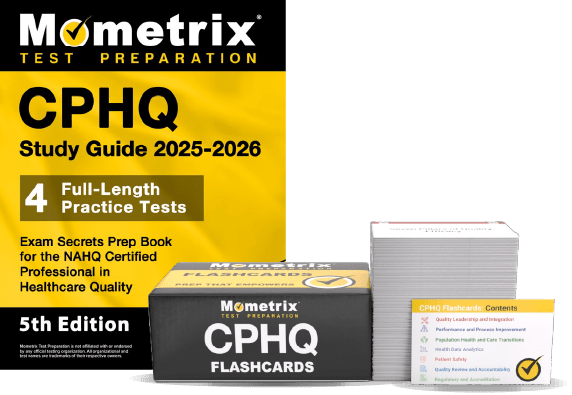If you need help studying for the Certified Professional in Healthcare Quality (CPHQ) exam or just want some more information about what the exam is like, you’ve come to the right place.
Click below to take a free CPHQ practice test!
What’s on the Exam?
How to Register
How is the Exam Scored?
Retaking the Exam
Online CPHQ Prep Course
FAQs
Exam Eligibility
The good news is that there are no eligibility requirements for the CPHQ exam! It’s recommended that you have at least a couple of years of healthcare experience before taking the exam, but it’s not a requirement.
What’s on the Exam?
First, let’s talk about the questions on the exam. There are 140 multiple-choice questions total, but only about 125 of the questions will count toward your score. Why is that?
The 15 unscored questions on the CPHQ exam are “pretest” questions. These are added to the exam to determine if they’re good enough questions to add to future versions of the test.
The trick is that you won’t have any way of knowing which questions are scored and which ones are pretest. They will appear just like the scored questions throughout the test.
The time limit for the exam is 3 hours. There aren’t any scheduled breaks, but you’re free to take restroom breaks as needed.
Let’s take a closer look at the seven sections of the CPHQ exam:
1. QUALITY LEADERSHIP AND INTEGRATION
19 scored questions
- Provide consultative support to the governing body and key stakeholders regarding their roles and responsibilities related to quality improvement
- Promote engagement and inter-professional teamwork
- Participate in activities that support the quality governance infrastructure
- Align quality and safety activities with strategic goals
- Identify resource needs to improve quality
- Advise leadership on organizational improvement opportunities
- Assist with the development of action plans or projects
- Assist with establishing priorities
- Assess the organization’s culture of quality and safety
- Engage stakeholders to promote quality and safety
2. PERFORMANCE AND PROCESS IMPROVEMENT
27 scored questions
- Use performance improvement methods
- Implement quality improvement training
- Establish teams, roles, responsibilities, and scope
- Lead and facilitate change
- Use quality tools and techniques
- Participate in activities to identify innovative or evidence-based practices
- Participate in monitoring of project timelines and deliverables
- Evaluate team effectiveness
- Evaluate the success of performance improvement projects and solutions
- Communicate quality improvement information within the organization
- Identify quality improvement opportunities
3. POPULATION HEALTH AND CARE TRANSITIONS
11 scored questions
- Collaborate with stakeholders to improve and optimize care processes and transitions
- Identify data and resources that are important in determining the health status of defined populations
- Identify population health management strategies to integrate into improvement initiatives
- Analyze and use clinical, cost, equity, and social determinants of health data to drive and monitor improvement efforts
- Identify opportunities for improvement in care transitions
- Incorporate prevention, wellness, and disease management solutions into improvement initiatives
- Incorporate techniques to address health disparities and promote equity into improvement initiatives
- Incorporate concepts of social determinants of health into improvement activities
4. HEALTH DATA ANALYTICS
26 scored questions
- Use measurement tools to evaluate process improvement
- Use statistics to describe data and examine relationships
- Assist in evaluating and developing data management systems to support quality improvement
- Identify and select measures
- Use data management systems for organization, analysis, and reporting of data
- Use data visualization and display techniques
- Use statistical process control techniques and tools
- Compare data sources to establish benchmarks
- Collect and validate quantitative and qualitative data
- Identify external data sources for comparison and benchmarking
- Design scorecards and dashboards for different audiences
- Interpret data to support decision-makings
- Design data collection plans
5. PATIENT SAFETY
18 scored questions
- Facilitate the ongoing evaluation of safety activities
- Participate in safety and risk management activities
- Identify technology solutions to enhance patient safety
- Apply techniques to enhance the culture of safety within the organization
- Integrate safety concepts throughout the organization
- Use safety principles
6. QUALITY REVIEW AND ACCOUNTABILITY
16 scored questions
- Maintain confidentiality of performance/quality improvement records and reports
- Apply standards, best practices, and other information from quality-related organizations
- Implement and evaluate quality initiatives that impact reimbursement
- Evaluate compliance with internal and external requirements
7. REGULATORY AND ACCREDITATION
8 scored questions
- Evaluate appropriate accreditation, certification, and recognition options
- Promote awareness of statutory and regulatory requirements within the organization
- Support processes for evaluating, monitoring, and improving compliance with organizational, state, and federal requirements
- Maintain survey or accreditation readiness
How to Register
To begin the registration process, you’ll need to create an account via the NAHQ website. This account will give you the ability to apply for the exam.
Once your application is approved, you have two registration options depending on how you choose to pay the exam fee.
- Credit Card: You can register for the exam and schedule your testing appointment via your NAHQ account online as soon as you receive confirmation of your application.
- Check: You’ll need to fill out and mail a physical application along with your check. Using this method means you’ll have to pay an extra $25 check processing fee.
The fee you pay is based on your NAHQ membership. Nonmembers pay a fee of $619, while members only have to pay $519.
How is the Exam Scored?
The CPHQ exam is scored using a scaled scoring method. Here’s how it works:
For every question you answer correctly, you get one point added to your raw score. At the end of the test, your final raw score will be converted to a scaled score. This scaled score will range somewhere between 200 and 800.
You will need a scaled score of at least 600 to pass the exam.
The reason your raw score is converted to a scaled score is because everyone that takes the test is given a slightly different set of questions. Since everyone has a different arrangement of questions, and because some questions are harder than others, converting your raw score to a scaled score ensures a more even playing field.
Retaking the Exam
If you didn’t get the score you wanted on your first try, that’s okay! You can reapply to take the exam again after a 90-day waiting period.
Online CPHQ Prep Course
If you want to be fully prepared, Mometrix offers an online CPHQ prep course. The course is designed to provide you with any and every resource you might want while studying. The CPHQ course includes:
- Review Lessons Covering Every Topic
- 950+ CPHQ Practice Questions
- More than 500 Digital Flashcards
- Money-back Guarantee
- Free Mobile Access
- and More!
The CPHQ prep course is designed to help any learner get everything they need to prepare for their CPHQ exam. Click below to check it out!
FAQs
How many questions are on the CPHQ exam?
The exam contains 140 multiple-choice questions.
What is the time limit for the CPHQ exam?
The exam is timed at 3 hours.
How hard is the CPHQ exam?
The CPHQ exam is considered to be a moderately difficult exam.
What is a CPHQ certification?
A CPHQ certification is used to demonstrate your abilities in advanced healthcare safety and quality. According to NAHQ, it’s the only fully accredited certification in healthcare safety.
How much is the CPHQ exam?
The standard exam fee is $619.
Is CPHQ certification worth it?
Obtaining CPHQ certification has the potential to boost your credibility, skills, and income in the realm of healthcare quality.



 CPHQ Online Course
CPHQ Online Course CPHQ Study Guide
CPHQ Study Guide CPHQ Flashcards
CPHQ Flashcards

